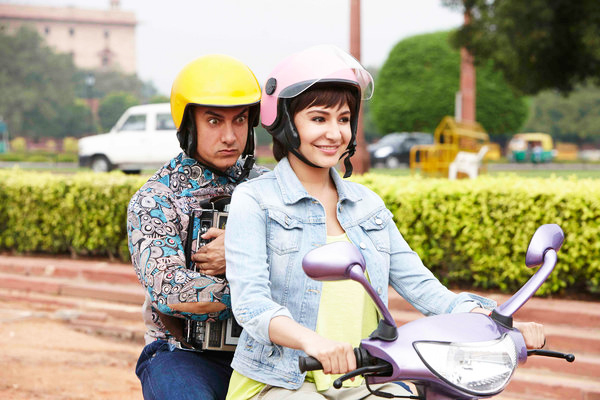Second Take: Controversy surrounding ‘PK’ should spark discussion, not censorship

(Courtesy of UTV Motion Pictures)
By Aalhad Patankar
Jan. 16, 2015 10:47 a.m.
While “The Interview” has been taking the internet world by storm, the release of another film an ocean away is stirring up a similar controversy.
Bollywood blockbuster “PK,” released earlier in December, has resulted in nationwide protests in India and backlash from certain groups for its alleged criticism of Hinduism and for distastefully offending religious sentiments. Its critics say it unfairly singles out Hindu practices for its argument, calling for its censorship.
But even more so than the burnt posters and vandalized theaters, I think there’s something bigger at stake: the chance for Bollywood to rise above being an entertainment-first entity, and expand into artistic, bold cinema that dares to challenge.
But wait, let me hop off my high horse a minute. What’s so controversial about it in the first place?
“PK” follows an alien named PK (Aamir Khan) who lands on Earth to explore human life and report back to his home planet. On his first contact with man, a local wanderer, his spaceship remote control gets stolen and with it, his way home. He looks completely human and, without the power of his remote, to the rest of the world he is just that. So he slowly learns the world around him and its people, all of whom tell him only one person can help him find his way back home: God.
Through PK’s naive eyes, his request to God is simple, but “finding God” is a complicated affair. Each religion seems to ask something different of him to reach its God. Not wanting to take chances, PK embraces each one: fasting, wine, church, temple and anything else regarded pious. However, he finds his calls to God unheard.
Eventually, PK reaches his own theory: that each prayer is like a phone call to God, asking for help. But PK thinks all the rituals and seemingly bizarre customs are going to a false God, who’s taking the real God’s calls and playing a prank on humanity, asking for things that make no logical sense to PK. As he puts it, if we are all children of God, why would he ask us to do bizarre feats of love, like paying a holy man a fee and trekking thousands of miles to another temple, only to ask the same question again?
For his peculiar theory, PK gets nationwide fame as a crusader against false god-men and self-proclaimed prophets, and against the commercialization of religion. His message resonates throughout the country, as people respond with videos exposing false prophets and religious cheaters with the viral message “Wrong Number.”
And that’s really the power behind the movie. Not in its challenge to aspects of Indian religious culture, but its challenge to the audience: to call out any wrong numbers in society. It encourages us to talk about issues we’re otherwise ashamed to, which is productive no matter what side of the debate you’re on.
But for all its provocations, “PK” at heart is a fairly respectful satire of a critical problem in India: commercialization and abuse of religious power. In its portrayal, it takes Indian society as a whole: beauty, religion, sex, taboos and all, whether charming or frightening. And even if it’s a tough pill to swallow, isn’t that the whole point?
Film around the world has been and continues to be a medium to question issues we can’t talk about over the dinner table, but we desperately need to. Whether or not you agree with the film’s message, it provokes discussion, and that’s the power of a huge industry like Bollywood that goes woefully underused. Censoring that is relinquishing Bollywood’s power to make change.
And as far as censorship goes, the film isn’t actually offensive nor does it set out to ridicule or belittle any religion, unless making any kind of statement about religion is an offense – an argument of the insecure.
It’s about time we stand up for the right of the Indian film industry to be daring enough to be provocative and introspective. It’s about time we say: yes, we love our synchronized dances and our darling romantic comedies, but Bollywood means more to us than that. And for the critics that claim it should be censored simply for making an argument? That sounds to me like a #WrongNumber.
– Aalhad Patankar


